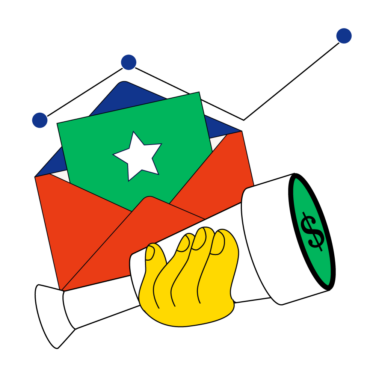If you’re looking to connect with your target audience more effectively, a CRM platform might be just what you need. CRM apps can help a business process new customers, follow up with quality leads, and improve its visibility on search engines and social media. If you’re not currently implementing CRM tools, our guide will review how using CRM can improve your customer interactions, add new customers to your sales pipeline, and improve customer loyalty.
What Is The CRM Process?
Customer relationship management (CRM) is the lifeblood of any business because you’re nothing without the customers that purchase your products and services. A CRM system helps you learn more about your potential customers’ needs, problems, and behavior. This information can then be used to make data-driven decisions on how to acquire new leads, nurture existing leads, and improve consumer retention rates so that you’re maximizing your return on investment (ROI).
Using CRM software is much more cost-effective today due to advances in automation, machine learning technology, and artificial intelligence. The key to an effective CRM process is knowing which elements of your customer relationship management need to be automated and which require interactions with a human.
For example, IBM has estimated that about 80% of customer questions can be answered to their satisfaction by a chatbot while the other 20% require the expertise or understanding of an actual person.
An effective CRM strategy utilizes your resources to the maximum efficiency by limiting how much time and money you dedicate to menial tasks that could be performed by a machine. When you think of the processes you use to reach potential clients, acquire new leads, convert web traffic into sales, and improve customer retention rates, how much of this work needs to be performed by a person? The right CRM software can reduce your overhead significantly while also identifying ways you can make your marketing team and salespeople more effective at their jobs.
The CRM process includes customer data management, sales automation, marketing automation, and customer service processes. When implemented the right way, you can use your CRM system to improve the customer experience on your website, increase average transaction values, retain more customers, and streamline your business operations.
The 5 Steps Of The CRM Cycle
The CRM solution for your business depends on multiple factors, but there are some things all CRM processes have in common. Your CRM process should aim to generate brand awareness, acquire quality leads, convert those leads into customers, and turn existing customers into repeat customers.
Your CRM process should also help you acquire and retain customers by providing quick and dependable customer service so that you can offer as many people as possible the user experience they want. When considering how to implement your CRM process, the following steps provide a good blueprint.
Generate Brand Awareness
You can’t sell anything if nobody knows who you are or what you produce. Generating brand awareness requires researching your customer base. You should try to identify which demographics are most likely to be interested in each of your products or services and which advertising channels are the most effective ways to reach them.
You may deploy multiple marketing strategies aimed at resonating with customers who have different backgrounds, locations, personality traits, product preferences, pain points, and financial lives. You should gather data on your web visitors and traffic sources to determine if your advertising is reaching the people you want it to or if your visitors are low-value leads who aren’t likely to be interested in what you have to offer.
Your marketing team can use the data you collect to glean better insights and make data-driven decisions regarding where to invest your advertising budget. What works for your business may depend on the demographics you’re targeting, so it’s important to customize your marketing campaigns to reach as many people in your target demographics as possible. If you notice that one marketing campaign strategy isn’t generating the traffic or leads that you want, you can invest your time and resources in the channels that produce better results.
Acquire Leads
Once you attract traffic to your website and build brand awareness, you can begin to generate high-quality leads. The types of visitors you want your sales team and marketing department to focus on are the ones that engage with your business. They may sign up to your newsletter, begin a free trial, or sign up for updates via email.
Quality leads include the people who interact with your site’s chat function, such as those who ask questions about your product pricing or specifications. It’s important that your CRM process is able to evaluate your leads’ behaviors on your site to identify which people are most likely to respond to specific marketing strategies. This is a process that’s often referred to as lead scoring, and can result in increased sales and average transaction value.
Once you’ve acquired your leads, you need to implement lead tracking to maintain engagement with them. The right CRM data can help you automate the sales process by assigning leads to sales reps based on key metrics that align with your salesperson’s experience or expertise.
Convert Leads Into Customers
Content marketing can help you with lead conversion by generating the data you need for marketing automation. How your visitors interact with your content could determine the next step in the marketing process. For example, your CRM software could decide that it’s better to direct a potential customer to a video or webinar in an email to get them to return to your site or determine that the lead is likely to respond better to a sales call.
The CRM process also evaluates what’s not working to determine if there’s any changes you could make to increase your conversion rates. For example, if many of your leads share a common pain point, your next marketing initiative could direct leads to a product or service that solves the problem.
Some people simply aren’t ready to do business today. Having an effective lead nurturing strategy allows you to keep attracting these leads back to your website so they’re aware of your company and products when they’re ready to make a purchasing decision. As long as you have your leads’ contact information, you can continue to invite them back to your site through the same communication channels.
Provide Quality Customer Support
While most people claim they’d like to speak with a human customer service representative in most instances, evidence now suggests that artificial intelligence is better at performing customer service functions. Octopus Energy, a UK-based utility company, determined that not only did an AI do a better job at answering customers’ questions, it was able to help 250 times as many customers as a human support team.
One of the reasons for this is frankly that a lot of people have the same questions or problems. An AI doesn’t have difficulty remembering how to answer a question it already knows the answer to while a human may need to look the answer up or take a little longer to recall it from memory. What Octopus Energy discovered was that people only prefer human customer service representatives when the issue is something too complex for a standard FAQ database.
When implementing your CRM process, providing quality customer support is essential to customer satisfaction. Not only does it help you close some sales you wouldn’t have otherwise, it generates repeat business. People aren’t going to stop using your products or services if you keep them happy unless a competitor gives them an extremely attractive reason to do so.
Calculating sales commissions for repeat customers can be tricky. These tools make it easier.
More Articles
- The 17 Best Account Management Books to Master Client Journeys
- What is Sales Forecasting? Your Key to Informed Decisions
- What is CPQ: A Guide to ‘Configure, Price, Quote’ for RevOps Teams
- 10 Best RevOps Communities (Free & Paid) To Join In 2024
- 12 Best Upcoming Analytics Conferences To Spend Your L&D Budget
Drive Upsells and Cross-Sells with Current Customers
Your CRM system can store data you’re able to use to sell to the people who’ve already purchased from you. Whether it’s a reminder to buy something when they’re likely to run out or suggesting new products based on their past purchasing behavior, you can leverage your customer data to increase the frequency and value of future sales transactions.
For example, if a customer purchases the same bag of dog food every two months from a pet store, they may receive an offer for a discount off a toy or box of treats if they add it to their next order. This small interaction can create a new habit and the customer will reload their cart with treats every time they buy food in the future.
Incorporate CRM Software Into Your Process
Whether you’re looking to grow your small business startup into a thriving business or scale your business in a manner that’s manageable, an effective CRM process is one of the best ways you can take your business to the next level. Don’t know where to begin? Check out our article on the 10 best CRM software programs in 2023.
Want more advice on how to leverage data to gain a competitive edge? Subscribe to our newsletter for the latest updates and news. Is there something we didn’t cover? Comment below if there’s anything you’d like to share about your experiences with CRM software.


